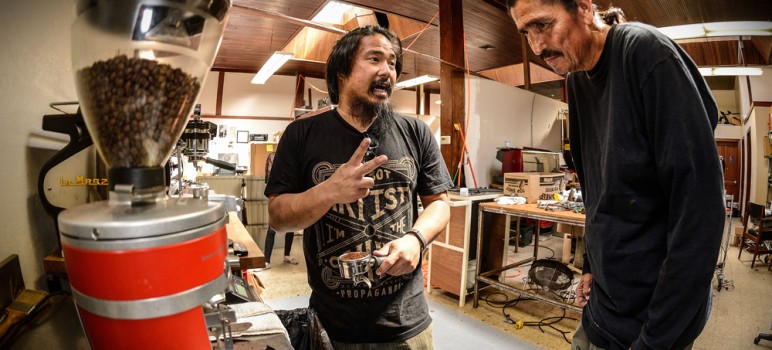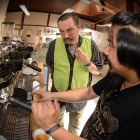With a magician's sleight-of-hand-deftness, Cris Mendoza grinds, taps, tamps and brews the coffee into a steaming, swirling espresso. The taste, he says after a sip, reminds him of scones and burnt muscovado sugar.
“What do you think?” the ponytailed Chromatic Coffee barista asks his trainees. Nick Carbajal and Drake Mitchell, armed with pens and clipboards, take a taste from the glass and try to detect the same sugary vim. The downtown San Jose roastery—crammed with gleaming Italian espresso machines and steel shelves of paper-bagged coffee—fills with the scent of a fresh roast over a low flame.
“You have to develop a taste for it,” Carbajal replies, jotting notes about chemistry, temperatures and flavor profiles. “This ain’t a cup of Folgers.”
Some hours into the training, Carbajal says he’s struck by the performative flair of his new craft—a far cry from the nose-to-the-grind beat of his past job in manual labor.
“People pay a premium for coffee this good, so you want to put on a show,” he says, adding that he comes from a long line of Comanche men who know their way around the kitchen. “I’m trying to master it—the precision, the whole thing—so I can be an expert, too, by the time I serve actual customers.”
Carbajal and Mitchell, who both have spent time living on the streets, will become the first baristas to work for Kartma when it launches next month. The first-of-its-kind coffee-cart startup will employ formerly homeless people, pay them a living wage ($12.50 an hour, to start) and equip them with not only the skills to brew gourmet coffee but to staff, stock, market and otherwise run a small business.
“We’ve been in San Jose for three years now and have proven that homeless men and women really do want another chance to work,” says Eileen Richardson, who created Kartma as a for-profit extension of Downtown Streets Team, a nonprofit she founded a decade ago to find housing and jobs for homeless people. “Now for the first time we have a business where we can actually place them. It’s self-sustaining and it will give them an opportunity to give them a real job with real, marketable skills they can transfer to other jobs.”
Kartma’s concept began as a boardroom pitch a year-and-a-half ago. The idea was to start a pedicab service as a social enterprise to create jobs for homeless clients. Downtown Streets Team Project Manager Zia MacWilliams suggested buying a tuk tuk, an agile three-wheeled electric vehicle she often saw while working for the United Nations on the Thai-Myanmar border some years earlier.
“I was thinking it could be like Lyft, something for short local rides,” she says. “Then we realized that everyone else was doing that. We needed something a little more unique.”
After more plotting and analysis and impassioned discussion, the Kartma idea morphed into its current iteration as a mobile coffee vendor. They’d still use the tuk tuk, while adding a second stationary cart, and court investors as a benefit corporation.
“Now, in addition to job placement, we have a tool to create jobs for the people we work with,” says Chad Bojorquez, the associate director of employment with Downtown Streets Team, which has helped more than 200 people find jobs in the past year alone.
“That’s huge. It’s one thing to place people in jobs, it’s another to actually create jobs for them.”
Leveraging the institutional backing of Downtown Streets Team as an established 10-year-old nonprofit, Kartma will venture into an emerging field of social entrepreneurship. A conventional corporation has the sole aim of maximizing shareholder value, while a traditional nonprofit relies on grants and donations. Benefit corporations, by contrast, are beholden to the triple bottom line of a social cause, environmental sustainability and profit.
In 2011, California became the sixth state in the nation to establish a tax designation for benefit corporations. Sweeping economic recession had stoked the public’s distrust of Wall Street and corporate America, launching a movement to reward companies committed to the public good. As a benefit corporation, Kartma could potentially go public, spin off as a franchise and rake in profit while fulfilling its social aim of employing the formerly homeless. Gearing up to launch next month, Kartma has raised money from eBay, the Knight Foundation, Technology Credit Union and crowdfunding through Indiegogo.
“That’s what we’re all about: market-based approaches that address poverty,” says Cassandra Staff, director of Santa Clara University’s Global Social Benefit Institute, which mentors benefit corporation founders.
“Kartma is exactly the type of project that we want to work with. It’s moving away from the typical aid model of giving things away. They’re saying we’re committed to ending homelessness and creating a business, a service and product, rather than soliciting from donors.”
Downtown Streets Team’s leaders hope that Kartma can also change the public’s perception about homelessness. “There’s this stereotype that homeless people don’t want to work,” Richardson says.
“There’s this attitude of, ‘Get a job, bum.’ But we’ve proven that these men and women want to work. We just need to be creative in how we get them jobs and how we train them.”
Downtown Streets Team already offers job placement for team members who graduate from the nonprofit’s work training. The goal is to leverage that network to find management positions for Kartma staffers who want to advance their careers.
“We don’t want them going from Kartma to working the register somewhere else,” Bojorquez says. “We’re training them to become supervisors.”
For 58-year-old Carbajal—whose drug and alcohol addictions dragged him in and out of jails, hospitals and creekside homeless camps—the Kartma job gives him a shot at upward mobility for the first time in years.
When San Jose dismantled its largest homeless settlement, The Jungle, just before Christmas last year, the South Bay native lost his longtime home, a weathered tent on the upper embankment. But he found a case manager through Downtown Streets Team as part of a city-funded effort to house displaced Jungle residents, and a paid gig cleaning up what was left of the Coyote Creek shantytown. A housing voucher comped his move to an old hotel on The Alameda. His body, which had been weakened by untreated diabetes and car crash-shattered bones, has since healed enough to weather a full day’s work.
Transitioning from the streets involves incessant appointments—doctors, caseworkers, parole officers, landlords and long-neglected debtors—a time-consuming catch-up from years off the grid. Carbajal says his hard-fought stability has given him a clearer view of the future and revived his ambitions, something he lost in “survival mode” on the streets.
“I see this as a stepping stone,” he says. “It feels good to make goals again.”
- A coffee contest at San Jose’s SoFA Market raised money for Kartma. (Photo by Greg Ramar)
- Drake Mitchell, a Downtown Streets Team member, learns how to brew an espresso from Chromatic Coffee barista Criz Mendoza. (Photo by Greg Ramar)
- Chromatic Coffee barista Cris Mendoza, left, trains Nick Carbajal for his new job running a mobile coffee cart. (Photo by Greg Ramar)
- From left: Drake Mitchell, Nick Carbajal and Cris Mendoza. (Photo by Greg Ramar)
- Judges at the coffee throwdown fundraiser, held at the SoFA Market in downtown San Jose. (Photo by Greg Ramar)







> Benefit corporations, by contrast, are beholden to the triple bottom line of a social cause, environmental sustainability and profit.
“No man can serve two masters: for either he will hate the one, and love the other; or else he will hold to the one, and despise the other. Ye cannot serve God and mammon.”
— Matthew 6:24
I’ll bet the the list of successful, enduring “benefit corporations” is not a long one.
Kartma is Amtrak spelled backwards…
Offensive and obnoxious, if you ask me.
Why is Wheedle allowed to post this?
…I’m feeling personally attacked
Well, actually, it was an impersonal attack.
I wasn’t attacking you, I was only attacking the idea of you.
Wow…looks like the comments section has been edited…
Mr. Meyer,
My post didn’t make the cut. I’m not sure if I crossed the line with my offensive lists of favorite orders, my referring to the homeless coffee servers as FUBARistas, or both.
As for what happened to JS Robilard’s very reasoned contribution, I have no idea.
Pleasant speech does not need protection. It is offensive and obnoxious speech that needs protection from the government, as well as from PC editors. Poor editing decision, Josh. If Josh were Don Rickles’ editor, poor Don would never have had a career in comedy.
As I have stated on several prior occasions, I am all in favor of providing jobs for anyone who wants to work but food handlers do have to have a California food handlers card and have to pass a simple test. Whereas many homeless people may not be literate or are borderline illiterate (that’s not a put-down, just an observation) I am wondering how this certification process will be handled. There is also a small fee involved as well and I am wondering who will be responsible for paying that, the business owner or the potential employee? I believe that the Kartma Coffee folks have their hearts in the right place but there may be better choices than food handling as a means of employing formerly homeless individuals.
In fact, it’s an old idea:
https://www.youtube.com/watch?v=zomwyZEYZNE